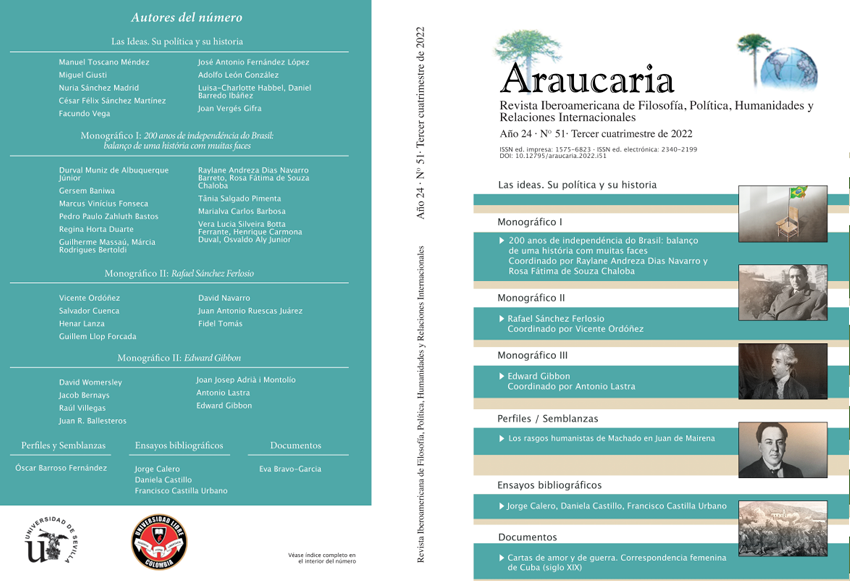Apprendre à vaincre en le regardant faire. Lo que Gibbon aprendió de Justo Lipsio.
DOI:
https://doi.org/10.12795/araucaria.2022.i51.32Palabras clave:
Gibbon, Lipsio, Pocock, Imperio, integración, sincroníaResumen
Justo Lipsio publicó en 1598 la primera ed. de Admiranda sive de magnitudine romana libri IV, una de las fuentes bibliográficas del Decline and Fall de Gibbon. El trabajo presenta las relaciones entre ambos proyectos historiográficos y revisa el análisis que de esa relación realizó J. G. A. Pococken Barbarism and Religion. Volume Three. The First Decline and Fall (2003).
Descargas
Citas
Juan R. Ballesteros, ‘Histoire et utopie dans les Admiranda de Lipse’, en De Gulden Passer 84 (2006), pp. 177-192.
—, ‘Del Anticuarismo a la Historia filosófica: Lipsio y el puente sobre el Danubio de Trajano’, en Lias. Sources and Documents relating to the Early Modern History of Ideas 33 (2006), pp. 59-74.
—, ‘¿Dónde nació Constantino? Una polémica humanística sobre falsificación y método histórico’, en Calamus Renascens. Revista de Humanismo y Tradición Clásica 9 (2008), pp. 99-110.
—, ‘Crítica de libros: J. G. A. Pocock, Barbarism and Religion. V. The First Triumph (2010)’, en Revista de Historiografía 15 (2011), pp. 184-187.
—, ‘“Facinerosi et perditi”: miradas humanistas sobre la antigua Grecia y sus lamentables (y locuaces) habitantes’, en Grecia ante los Imperios. V Reunión de historiadores del mundo griego, ed. de J. M. Cortés Copete, E. Muñiz Grijalvo, R. Gordillo Hervás, Universidad de Sevilla, 2011, 393-402.
Peter Brown, Power and Persuasion in Late Antiquity. Towards a Christian Empire, The University of Wisconsin Press, Madison, 1992.
François Dosse, Pierre Nora. Homo historicus, Perrin, París, 2011.
John H. Elliott, ‘A Europe of Composite Monarchies’, en Past and Present 137 (1992), pp. 48-71.
Edward Gibbon, The Decline and Fall of The Roman Empire, Everyman’s Library, Londres, 1993, 6 vols.
—, Memorias de mi vida, ed. de A. Lastra, Cátedra, Madrid, 2022.
Marcel Granet, La religion des chinois, prefacio de Georges Dumézil (1989), Albin Michel, París, 2010.
Jeanine De Landtsheer, In Pursuit of the Muses. The Life and Work of Justus Lipsius, LYSA, Gante, 2021.
The Library of Edward Gibbon. A Catalogue, ed. de G. Keynes, St Paul’s Bibliographies, Dorchester, 19802.
Justus Lipsius, Opera omnia, ap. Andream ab Hoogenhuysen et Societatem, Wesel, 1675, 8 vols.; facs. Georg Olms Verlag, Hildesheim/Zürich/Nueva York, 2003.
Justo Lipsio, Admiranda. Cuatro libros sobre la Grandeza Romana, ed. de J. R. Ballesteros, Bibliotheca Montaniana, Huelva, 2021.
Anthony David Nuttall, Dead from the Waist Down. Scholars and Scholarship in Literature and the Popular Imagination, Yale University Press, New Haven y Londres, 2003.
J. G. A. Pocock, ‘What Do We Mean by Europe?’, en The Wilson Quarterly 21 (1997), pp. 12-29., p. 28.
—, Political thought and History. Essays on Theory and Method, Cambridge University Press, 2009.
—, ‘Where Are We Now? Reponses to the referendum’, en London Review of Books 38.14 (2016), on line [consulta 28/07/2022].
Iggy Pop, ‘Caesar Lives’, en Classics Ireland 2 (1995), pp. 94-96.
Jonathan Rose, The Literary Churchill. Author, Reader, Actor, Yale University Press, New Haven y Londres, 2015.
Descargas
Publicado
Cómo citar
Número
Sección
Licencia
Las ediciones impresa y electrónica de esta Revista son editadas por el Secretariado de Publicaciones de la Universidad de Sevilla, siendo necesario citar la procedencia en cualquier reproducción parcial o total.Salvo indicación contraria, todos los contenidos de la edición electrónica se distribuyen bajo una licencia de uso y distribución “Creative Commons Atribución-NoComercial-SinDerivar 4.0 Internacional”








